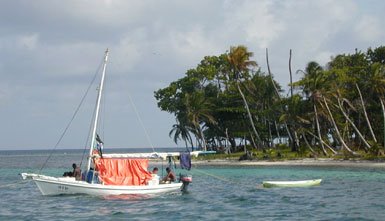
That's how a Belizean primary school principal describes the discovery of oil in her Caribbean country. Oil is going to change things, that is for sure.
Belize (British Honduras before independence in 1981) has long served as a supplier of desirable exotic goods to wealthy foreign countries. But sugarcane, citrus and bananas don't thrust you into the eye of the storm the way black gold priced at over $60 a barrel does.
Annual per capita income in Belize is $3940. Less than in Mexico ($9600); ahead of neighboring Honduras ($2800). Certainly not affluent.
Aside from its agricultural exports, Belize's main source of income has been tourism, especially ecotourism. (Yes, that's how I came to take the picture above.) Belizean's are proud of their own efforts to preserve and display their natural environment. The national Protected Areas Conservation Trust (PACT) explains:
Now it is easy to wonder whether there may be a little more talk than walk in PACT's description. Much of the coral in the barrier reef is dying, victim of global warming and too many cruise ships. Demand for hydropower has led to dam construction that intruded on protected forests. But, all in all, Belize has remained out of the maelstrom of international development politics, a slightly sleepy, somewhat protected backwater.Belize has become one of the world's most biologically diverse nations with the integrity of its natural resources still very much intact. It boasts 93% of its land under forest covers, the largest coral reef in the western hemisphere (second only to Australia's), the largest cave system in Central America, over 500 species of birds, thousands of Maya archaeological temples and the only jaguar reserve in the world. With only 8, 867 square miles (22,960 sq.. km) and 250,000 people, the population density is the lowest in the Central American region and one of the lowest in the world. The only country in Central America with English as its official language, Belize also boasts a rich mix of ethnicities including Creole, Maya, Mestizo, East Indian, Chinese, Garifuna and Mennonite.
The people of Belize have for years monitored its rate of economic development, agricultural expansion and tourism growth in particular. A conservation consciousness has emerged that challenges the government, private sector, investors and the public at large to balance development with conservation of its natural resources. Consequently, to date Belize has 42% of its land under some form of legal protected status.
Not anymore.
Nonetheless, this is about undreamed of wealth in a very poor place. "Minister of Natural Resources John Briceno calculates that at current prices, the government's take from even modest oil production of around 60,000 barrels a day would cover the entire national budget."Because the nation lacks a refinery, pipelines or other basic petroleum infrastructure, the oil must be moved by tanker trucks along narrow, pitted roads to the docks in the southern city of Big Creek for export.
"We simply aren't prepared," said Godsman Ellis, president of the Belize Institute of Environmental Law and Policy, who says that spills and other disasters are inevitable.
Belize is a lovely country. Let's hope oil makes most Belizeans' lives better, rather than destroying a difficult, but sustainable, way of life.
5 comments:
That is the most depressing story I've read in a while. Thanks for getting it out there, however.
I don't think this is depressing, this could be the best thing that ever happen for Belize
I agree with sfmike in being worried by this discovery -- but also, like anonymous, I can imagine that it might be a tremendous boon to many Belizeans.
According to a popular rendering of a Chinese proverb: "in crisis there is opportunity." I do suspect that oil in Belize represents "crisis," not unalloyed blessing. But it is also opportunity....
i am actually from belize. it is a sad but fortunate thing that has happened to belize, the finding of oil. it is fortunate and sad that oil may be what brings our country out of debt but i fear that it will come at a high price, that of the environment. i am weary of putting such a valuable and important asset in the hands of our present government also.
I agree with the above to a certain degree, it will come at a high price, that is, the belizeans will not gain anything from this discovery. A false sense of security for the country will occur, and devaluation of the dollar is inevitable. In fact, in theory, the dollar is already devalued by virtue of the increase in prices in all things..gas etc. Therefore I believe, that a foreign committee must be put in place to exercise proper variable analysis over the situation at hand.
Post a Comment